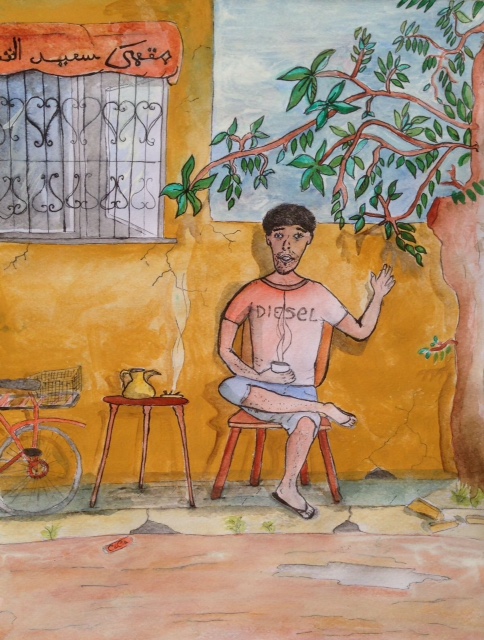Written and illustrated by David Suber and Roshan De Stone
Crossing the Mediterranean irregularly – that is, without a visa – is not the only peril that Tunisians face when deciding to travel to Italy. Having an irregular status upon arrival makes the chance of regular employment nearly impossible. In Tunis, the capital of Tunisia, we met many young men who had experienced the dangers and dilemmas of this type of migration and life. Mustafa was one of them.
Dressed in shorts, flip-flops and accompanied by an effortless smile that often folded into an easy laugh, we met Mustafa in a banlieue in the south of Tunis, where he frequented his local Qahweh (coffee shop) and appeared to know everybody who passed by. As we sat and talked, sipping coffee amongst endless rounds of chain-smoked cigarettes, cars, scooters, bicycles and pedestrians would stop and handshakes would be exchanged along with the usual daily salutations and greetings “Salam, labess?”, “Labess, Alhamdulillah” (‘Hello, all is good?’ ‘All good, thanks God’). We mostly spoke in Italian to each other. Like many other thirty-years-old men in Tunisia, Mustafa knew Italian perfectly, having learned it before ever setting foot in Italy by simply watching Italian RAI 1 TV programmes, the first foreign channel to be transmitted on Tunisian television.

Mustafa sitting outside his local Qahweh (coffee shop). Illustration by David Suber
Always happy to chat away, Mustafa never told us his story in one piece. Rather, he would hand us out bits from a puzzle, mixed together with fragments and memories of other people too. Having migrated to Italy without a visa nearly ten years ago, his time there had never been easy. He had lived nearly everywhere in the peninsula, often moving from one place to the next in search of work, finally settling down in 2009 to marry an Italian women in Perugia. Deported back to Tunisia over petty crimes in 2010, he again made the journey in 2011, right after the revolution. Despite months spent at the detention center in Lampedusa awaiting identification and potential expulsion, he was amongst the few Tunisians to be given a temporary six months visa.
His second deportation happened in 2015, when the Italian authorities found out his visa had expired. It was at this point that he decided to try his chances in Tunisia. Along with his wife, he established a business wherein she would drive from Italy to Tunis with a van full of second hand tat – juicers, dishwashers, jewellery, furniture – that he would then sell at various markets in Tunis. Mustafa often proudly repeated he had invented his own professional trade-routes in order to avoid wasting the rest of his ‘best years’ selling zatla (hashish) in the dark alleyways of Italian cities.
Others would often drop in and join the conversations; Mustafa would act as translator and most people would be quite open about their stories when he was around. Wolid had spent 22 years in Italy working as a builder and electrician before being threatened with expulsion in 2012. Knowing what to expect, he had decided to return by himself rather than wait months in detention. “Italians call this ‘voluntary’ return”, Mustafa would point out. Lofti and Mohamed instead, both in their twenties, had just been deported with a charter flight from Palermo, having spent less than three weeks in Italy. “We were unlucky this time”, they laughed. Especially amongst the younger men in the community, Mustafa commanded a certain respect. Only later did we understand why.
————————
A few words on Tunisia’s political/migration context:
Between December and January 2011 the Tunisian people took to the streets en-mass, overthrowing the oppressive regime of Zine Ben Abidine Ben Ali, who had ruled the country since 1987. Taking advantage of the ensuing decline in border controls, thousands of Tunisians took the sea, and approximately 22,000 Tunisians arrived in Lampedusa between January and April 2011. Many others did not survive the journey. Alongside the hundreds of deaths at sea in those months alone, the whereabouts of more than 600 Tunisians are still unknown. However, after renewed Italian-Tunisian agreements re-established border controls in April 2011, migration did not stop, but just started being organised differently. From interviews held with Tunisians who undertook the journey in the last three years, it seems that today’s crossings, differently from the overcrowded ships leaving Tunisia in 2011, are mostly organised on small fishermen boats, smuggling only a few passengers at a time by safely and silently dropping them on Italian shores undetected.
————————
During his nearly ten years in Italy, Mustafa had made connections with an extensive network of Tunisians in different parts of the country. Since his last return to Tunis, he had become renowned in the area for recommending youngsters, who wanted to leave Tunisia, about the risks and opportunities of the journey. On a case by case basis, he would link them up with his contacts across Italy, providing future harraga(irregular migrants) with the necessary connections to find a job, accommodation and protection on arrival, even if undocumented.
“Everyone wants a chance to make it to Europe”, he would often remind us, speaking in a fast Italian dialect. He spoke out of experience: “I’m no saint, but can you blame me? Can’t you see how many young boys sit around here, doing nothing but chewing on cigarettes? Nobody wants to remain sitting here playing cards all their life.”
Slowly but surely, considering the stagnant economic and political situation of the country, growing numbers of young unemployed Tunisians dream of trying their luck by crossing the Mediterranean. Mustafa, one who has tried his luck more than once already, is today the link between endless card games in a café of a Tunisian suburb, and the many struggles and possibilities involved in crossing over to Europe, in search for a better life.
